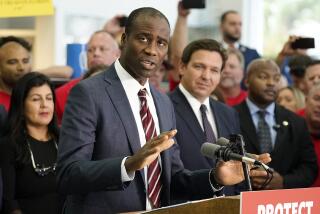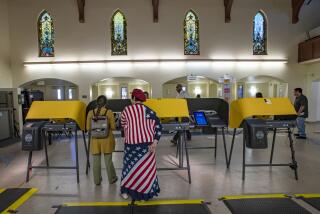For Whom Do the Polls Toll? The Silenced Majority
- Share via
As a social scientist who was trained in survey research, I’m mad as hell at polls--all polls, the scientific ones and the unscientific ones, though for different reasons. The country has gone completely around the bend on this. It’s as if we can’t make a decision about a candidate, a policy or even a movie unless we feel that we share the majority view. “Safety in numbers,” we cry, as the numbers drown us.
Consider the growing popularity of that pseudo-poll, the volunteer call-in vote. Even the otherwise sophisticated Michael Jackson, of radio show fame, invited his listeners to call the station and vote on who had “won” the vice-presidential debate. “This isn’t a scientifically accurate poll,” he said coyly (to which the only appropriate reaction is, then why do it? ), but “it does reflect a cross-section of the population.” This disclaimer is irrelevant; it implies that the results are meaningful when they are not. A bunch of volunteer callers doesn’t represent anyone but themselves, no matter how varied their place on the spectrum. Strange though it may seem to the statistically uninitiated, the responses of a randomly selected sample of 1,000 people can tell you what 140 million people believe; a sample of 10,000 people who have volunteered their opinions tells you only what those 10,000 believe.
Of course, radio and TV encourage audience participation because it is entertaining--and it doesn’t hurt the ratings. Well, what’s wrong with that? Isn’t it all just a game?
No, it isn’t.
A friend of mine once went into a decline when he heard on local TV news that “70% of all Americans think Oliver North is a hero.” Actually, 70% of all Americans think Oliver North is a liar and a crook. My friend had missed the show’s disclaimer that it was reporting the results of its “unscientific poll”; he had been deceived by all the Oliver North fans who had called in droves to praise their pet. Of course, that was their goal--creating the impression that theirs was the majority view.
In this mad election season, I’m not very sanguine about professional opinion polls, either. For one thing, that’s just what they measure: opinion, as opposed to conviction. That’s why survey results about the candidates change so often and are so unreliable, varying according to the respondents’ mood and the phrasing of questions. The polls do not discriminate between informed people whose political views are anchored in a broader philosophy and those who make voting decisions based, as one radio caller plans to do, on Dan Quayle’s eyes (she likes them) rather than Michael Dukakis’ hair (she dislikes it).
Even that guru of public-opinion research, Daniel Yankelovich, recently observed that survey results this election year are virtually meaningless because of the conflict and ambivalence that voters feel. Polls tell us only what people say they will do; but when so many are undecided, Yankelovich observes, what people say bears little relation to what they might do. Voters will make their real decisions, he believes, in the few days before the election. Or in the voting booth.
To look at the Times-Mirror/Gallup series of polls of the electorate, though, you’d never know that. Gallup is busy making hairpin refinements in profiles of the electorate, typecasting voters as “upbeats,” “disaffecteds,” “God and Country Democrats,” “moralists” and the like. If you filled out the full-page questionnaire that appeared in The Los Angeles Times last week, you’ll get a card telling you which candidate most people of your “type” will vote for (as of the latest poll, I assume). Just in case you are still undecided, now you can choose your candidate based on where you “fit in.”
The obsession with polls is hazardous to our political and psychological health. Not only are politicians becoming increasingly reliant on them for policy decisions, but polls also are succeeding in bullying and silencing people who are led to believe that they are a minority.
Americans don’t like to be out of step. For all our much-vaunted “individualism,” we feel that it is somehow un-American to be “different.”
Psychologists Gary Marks and Norman Miller have identified a common human delusion that they call the “false consensus effect”: the tendency for people to believe that their own desires, beliefs and even personal problems are shared by the majority. By overestimating the degree of agreement between themselves and others, people maintain their self-esteem, reduce the discomfort of inconsistency or feeling “weird,” and maintain their self-righteousness.
All that’s normal--but it is worrying for democracy. Some people with minority views respond by trying to persuade everyone (and themselves) that they are the majority. Others with minority views respond with apathy and depression. “There’s no point doing anything,” they say. “There’s no point voting for a loser.” So they stop speaking up, or voting, thereby creating a self-fulfilling prophecy.
All of this is why, from now until Election Day, I’m going to ignore the pollsters. If they ask my opinion, I’ll say that I’m voting for Michael Jackson (and they can guess which one). And, recklessly, I am going to assume that the majority of voters will make their decisions on something other than the latest poll--or the color of Dan Quayle’s eyes.
More to Read
Get the L.A. Times Politics newsletter
Deeply reported insights into legislation, politics and policy from Sacramento, Washington and beyond. In your inbox twice per week.
You may occasionally receive promotional content from the Los Angeles Times.










